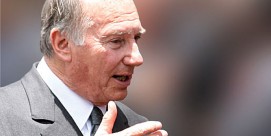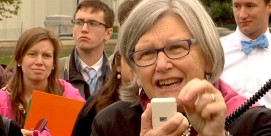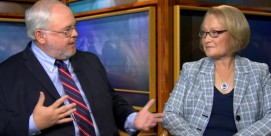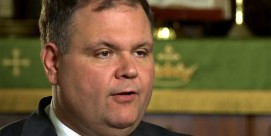Senate Democrats: “Shared Values and Common Ground”
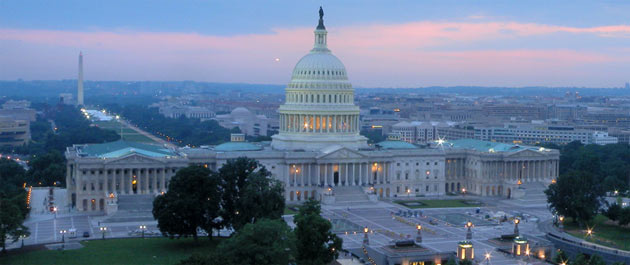
In a July 28 roundtable discussion on Capitol Hill with religion reporters, Democratic senators acknowledged the involvement of faith communities in debating moral and social issues such as health care reform and economic recovery, but they also questioned whether there are limits to the role religious groups can play when it comes to what Minnesota Senator Amy Klobuchar called “dealing with the nitty gritty” of partisan politics.
No cameras were allowed at the meeting, billed by the Democratic Steering and Outreach Committee as a conversation about “shared values and common ground.” It was one of several “faith and media” discussions Senate Democrats have held since 2008, responding to criticism of weak Democratic outreach to religious voters and faith communities over the years. The last session with religion reporters was held in October 2009.
Michigan Senator Debbie Stabenow, a member of the United Methodist Church who chairs the committee, said Democrats have been “governing with a different set of values” for the past 18 months. “It’s not about a particular president,” she said. “It’s about a philosophy we debate every day on the Senate floor.”
Stabenow cited Wall Street reform, job creation, economic stability, small business credit access, and extension of unemployment benefits among the Congress’s recent accomplishments, despite what she called “a maze of filibusters.” She thanked faith communities “for being with us every step of the way” and for supporting passage of last year’s Recovery and Reinvestment Act and this year’s health care reform bill—domestic policy achievements that “wouldn’t have gotten done without the strong voice and commitment” of communities of faith, she said.
Ohio Senator Sherrod Brown, a member of the Evangelical Lutheran Church in America, praised the economic and social justice values of religious groups, citing a trip he took with Illinois Senator Dick Durbin earlier this year to examine peacekeeping issues and US foreign assistance programs in Sub-Saharan Africa, where Brown said “so many faith-based groups deliver direct services.” The values that underlie their work, he said, are “what bind us,” and such values should inform “what we ought to be doing in foreign policy.”
Both Durbin and Maryland Senator Ben Cardin addressed the looming foreign policy issue of America’s nine-year-old war in Afghanistan, where Cardin acknowledged that the lack of a legitimate, credible partner is “testing the resolve of the American people.” Durbin, who voted against the Iraq war but for the Afghanistan war, said the consequences of combat in Afghanistan, particularly growing numbers of wounded and disabled veterans, “weigh dearly on me.” He added that Americans must continue to ask not only what the US has achieved in Afghanistan but also “how will it end, when will it end, and at what cost.” This week, more than 100 Democrats in the House of Representatives voted against a $58.8-billion war funding bill, which passed 308 to 114.
Asked about arms control and nuclear nonproliferation, issues long of concern to religious groups, and about prospects for Senate ratification of the New START treaty, Oregon Senator Jeff Merkley said it will be “a very heavy lift to get it done.” Merkley said the treaty is in trouble “because it’s an election year,” and there are “not many voices to depoliticize” the debate, despite what he called “an international social contract around nonproliferation.” Merkley praised Republican Senator Richard Lugar of Indiana for trying to keep the treaty “out of the political realm” and called for more grassroots efforts to weigh in on its importance. At town hall meetings, said Merkley, he hears only from treaty opponents, and “that’s a problem.”
But just how far religious groups and communities of faith are willing and able to go when they enter the political fray on moral and social issues was a question raised by Klobuchar, who suggested there are “limits on advocacy” for religious coalitions. She said that is especially the case when Republicans represent “a clear obstacle to moving forward” in areas such as immigration reform, one issue that has attracted considerable faith-based support across the spectrum. “How far can they go in pointing out the obstacle?” asked Klobuchar. “How strong an advocate can they be?” Durbin added that while 11 Republican senators once supported immigration reform, now there are none. “That’s what’s stopping us” from passing a bill, he said.
Klobuchar said in conference calls with Minnesota faith leaders about Senate slowness on immigration issues she has been told that when it comes to pure political strategy, religious groups are “not involved” and “don’t deal with that stuff.” How, then, can faith communities “play a larger and louder role” and “push back,” she asked, at a time when the politics of immigration reform are most at issue? Can they serve as a force and a voice for getting past political differences to common ground? Stabenow added that some religious groups do, in fact, have “comfort in the partisan arena” and are willing to “get into strategy and partisan differences.”
Asked about a reported decline in Democratic Party outreach to faith communities, Stabenow characterized Senate Democratic outreach as “aggressive” and “not diminishing.”
“Every issue,” Stabenow said, “is about values.”


